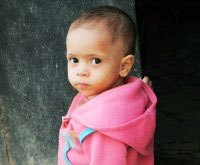 Children are particularly susceptible to the health effects of damp and mold, which include respiratory disorders. Photo credit: WHORespiratory tract diseases are diseases that affect the air passages, including the nasal passages, the bronchi and the lungs. Respiratory conditions include acute respiratory infections as well as chronic respiratory diseases, such as asthma, chronic obstructive pulmonary disease and lung cancer.
Children are particularly susceptible to the health effects of damp and mold, which include respiratory disorders. Photo credit: WHORespiratory tract diseases are diseases that affect the air passages, including the nasal passages, the bronchi and the lungs. Respiratory conditions include acute respiratory infections as well as chronic respiratory diseases, such as asthma, chronic obstructive pulmonary disease and lung cancer.
The burden of respiratory conditions is aggravated by multiple determinants. The direct and indirect exposure to tobacco smoke is the principal risk factor for its development. Other important factors include heavy exposure to air pollution derived from indoor and outdoor sources, occupational related disorders, malnutrition and low birth weight, and multiple early lung infections.
Socioeconomic factors play an important role in increasing the prevalence and severity of disease through environmental determinants, and can be related to lack of access to appropriate care.




